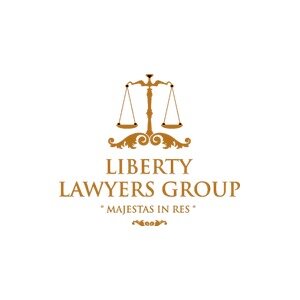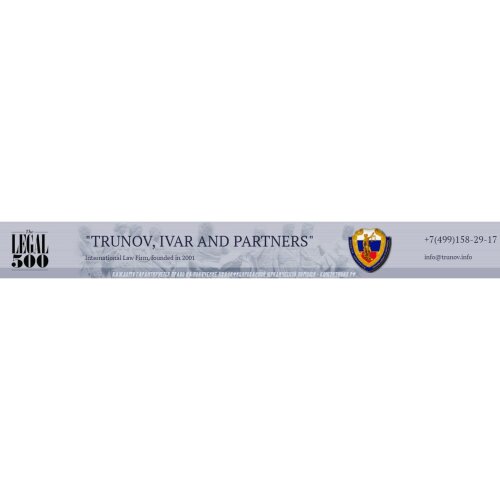Best Constitutional Law Lawyers in Moscow
Share your needs with us, get contacted by law firms.
Free. Takes 2 min.
List of the best lawyers in Moscow, Russia
About Constitutional Law in Moscow, Russia
Constitutional Law in Moscow, Russia, pertains to the legal framework established by the Russian Constitution that governs the relationship between the state and its citizens, and delineates the fundamental rights and duties of the people and the government. It covers a broad array of issues, including but not limited to the division of powers, governance, civil and human rights, and the rule of law. Moscow, being the capital city, often sees the development and enforcement of these laws within the context of national legislation, setting legislative precedents that can impact the entire Russian Federation.
Why You May Need a Lawyer
Legal assistance in Constitutional Law may be necessary under several circumstances:
- If you believe your constitutional rights have been infringed upon by government actions or laws.
- If you are involved in litigation or legal proceedings regarding the constitutionality of laws.
- If you're a civil rights advocate dealing with freedom of speech, assembly, or the right to privacy.
- If you represent or govern an organization in need of guidance on compliance with constitutional mandates.
- If you're facing legal interpretations that require an understanding of the Constitution's application in Moscow.
Local Laws Overview
Moscow, as the seat of federal power, is integral to the enactment and enforcement of constitutional provisions. Understanding the following key aspects is crucial:
- Human and Civil Rights: Moscow adheres to the federal Constitution that guarantees fundamental rights and freedoms, including equality before the law, freedom of expression, and the right to a fair trial.
- Division of Powers: The Constitution outlines a separation of powers between the executive, legislative, and judicial branches, affecting how laws are enacted and enforced locally.
- Rule of Law: Moscow operates under the principle that laws must be publicly promulgated, equally enforced, and independently adjudicated.
- Judicial Review: The Constitutional Court of the Russian Federation, based in Moscow, has the authority to interpret the Constitution and has the power to invalidate laws by declaring them unconstitutional.
Frequently Asked Questions
What rights are protected under the Russian Constitution?
The Constitution protects numerous rights, including the right to dignity, personal freedom, freedom of speech, assembly, religion, and the right to privacy.
How does one challenge a law as unconstitutional in Moscow?
To challenge a law, individuals or organizations can file a petition with the Constitutional Court, which then assesses the compatibility of the law with the Constitution.
What is the role of the Constitutional Court in Russia?
The Constitutional Court ensures that laws are consistent with the Russian Constitution, playing a pivotal role in constitutional oversight through judicial review.
Can constitutional rights be limited?
In certain situations, rights can be restricted by law for purposes such as the protection of national security, public order, or health, but must always adhere to constitutional principles.
Where can I access the official text of the Russian Constitution?
The official text is available at government libraries, legal depositories, and is often accessible online through governmental websites.
What processes are involved in amending the Russian Constitution?
Amendments involve a legislative process requiring two-thirds approval by both chambers of the Federal Assembly and additional procedures for significant amendments concerning federal structure.
Who enforces constitutional rights in Moscow?
Constitutional rights are enforced by various bodies, including the judiciary, law enforcement agencies, and human rights ombudsmen.
How can citizens participate in constitutional matters?
Citizens can participate through public consultations, referenda, and by petitioning governmental bodies on constitutional issues.
What steps should I take if my constitutional rights are violated?
You should gather evidence, seek legal counsel, and consider filing a complaint with the appropriate judicial or human rights body.
Is there a statute of limitations on constitutional claims?
Yes, there are often time limits to bring certain constitutional claims, which vary based on the type of right involved and the nature of the infringement.
Additional Resources
For those seeking further assistance or information, consider the following resources:
- The Constitutional Court of the Russian Federation
- State Duma Legal Affairs Office
- Moscow Bar Association
- Federal Ombudsman for Human Rights
- NGOs specializing in human rights in Moscow
Next Steps
If you need legal assistance in Constitutional Law, it is advisable to contact a lawyer specialized in this area. Consider the following steps:
- Identify and contact a qualified constitutional lawyer or legal firm in Moscow.
- Prepare all relevant information and documents pertaining to your case.
- Schedule a consultation to discuss your specific circumstances and explore legal options.
- Consider accessing free legal advice services if eligible, offered by some law schools or NGOs.
Lawzana helps you find the best lawyers and law firms in Moscow through a curated and pre-screened list of qualified legal professionals. Our platform offers rankings and detailed profiles of attorneys and law firms, allowing you to compare based on practice areas, including Constitutional Law, experience, and client feedback.
Each profile includes a description of the firm's areas of practice, client reviews, team members and partners, year of establishment, spoken languages, office locations, contact information, social media presence, and any published articles or resources. Most firms on our platform speak English and are experienced in both local and international legal matters.
Get a quote from top-rated law firms in Moscow, Russia — quickly, securely, and without unnecessary hassle.
Disclaimer:
The information provided on this page is for general informational purposes only and does not constitute legal advice. While we strive to ensure the accuracy and relevance of the content, legal information may change over time, and interpretations of the law can vary. You should always consult with a qualified legal professional for advice specific to your situation.
We disclaim all liability for actions taken or not taken based on the content of this page. If you believe any information is incorrect or outdated, please contact us, and we will review and update it where appropriate.













